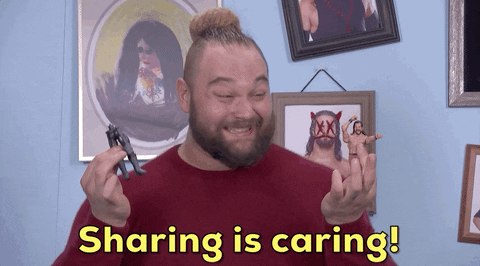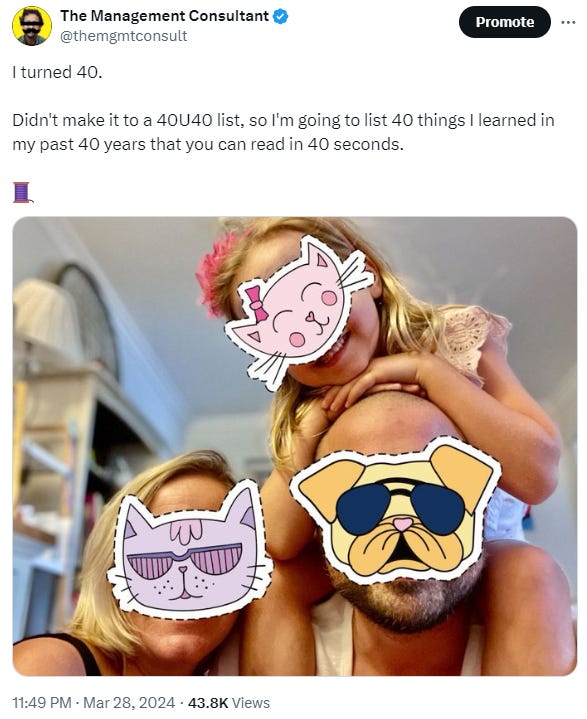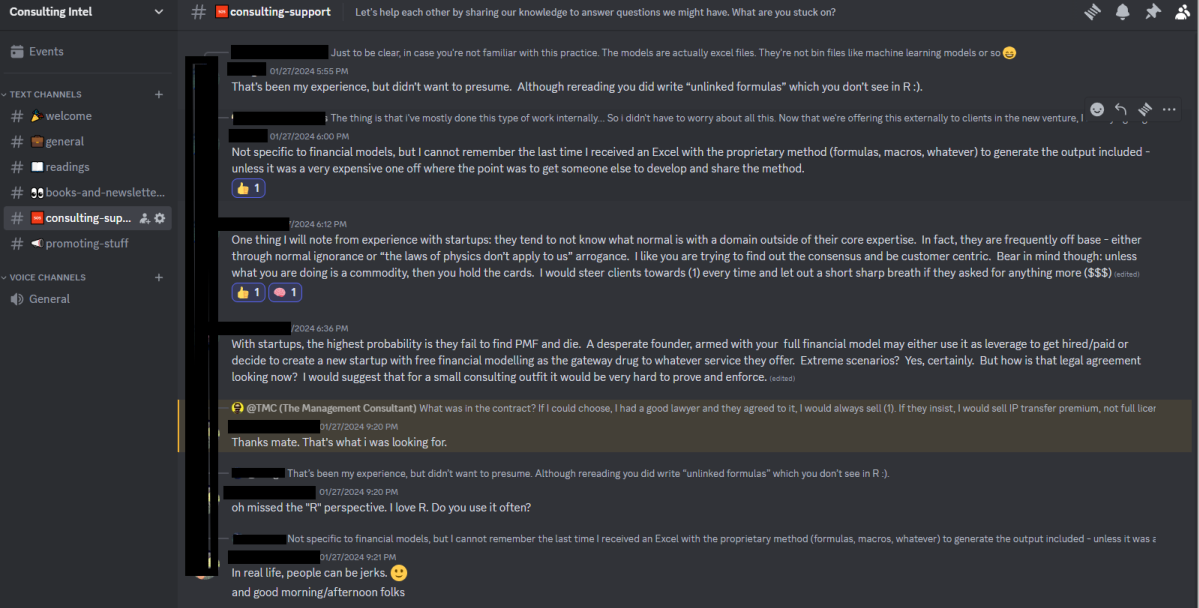The 4 steps to recognize and beat impostor syndrome
Think through the steps but beware: impostor syndrome will never truly go away.
Hello to the 1,427 subscribers who read Consulting Intel! Don’t forget to SHARE this newsletter around!
When your career progression is based on living a high-performance lifestyle, it is normal not to find the time to take a step back and reflect on your journey and current standing.
It is also wholly humane to reach a place you have worked hard for but feel dread or, worse, doubt your sense of belonging there.
Each milestone you achieve means that new doors open for you, opportunities you never thought existed present themselves to you, and you say YES to them.
That’s how you got this far in the first place: by saying I will figure it out and then doing it better.
But each time you step into a room, it is shinier than the last one.
A wave of fear sprouts at the root of your spine; a voice all too familiar reminds you of its existence, breaking your stride. You keep walking anyway… ’cause that’s how you got this far.
When I moved to Asia, I got catapulted into a failing project in the treasury department of a massive insurance firm, where a team of 20 people had been unable to deliver anything significant for the previous six months.
I was asked to fix it.
I was knee-deep in client work, juggling PowerPoint presentations, project plans, and financial modeling spreadsheets while talking about exotic financial products like a seasoned pro.
Or so everyone thought.
Behind the confident presentations and the assertive emails, a nagging voice whispered:
“You’re not good enough. You don’t deserve this. You’ve never done this before. How TF do you think you can answer all these questions all these people keep asking you?”
It was impostor syndrome.
The turning point came when my boss, Sandra, a veteran in the business (she’s retired now) with a knack for spotting potential, sat me down and gave me a talk.
“You’re ready for the next step,” she said, pushing for a promotion I hadn’t even dreamed of asking for.
Her faith in me was bewildering.
Why did she trust me more than I trusted myself?
This conundrum led me down a path of self-reflection and discovery, and what I realized was that impostor syndrome was acting like a mirage distorting my self-perception.
The more I talked to peers and other senior team members, the more I found that this wasn’t a solitary battle but a widespread phenomenon, affecting even the most outwardly confident individuals.
Drawing from this well of collective experiences and my journey, I began to see impostor syndrome not really as a barrier but more as a signpost.
It was a signal showing me areas for growth and self-belief.
Here are the 4 essential nuggets of what I’ve learned.
Recognize the impostor syndrome for what it is: a psychological pattern. It doesn't define your capabilities or your worth. It’s a feeling, an emotion, and like all emotions, it is fleeting. Acknowledge its presence, but don’t let it steer the ship. One day, it’s there. The next day, it will be gone.
Don’t hide it too much. Share your feelings with trusted colleagues or mentors. You’d be surprised how many feel the same as you do and how liberating it is to open up. Vulnerability is not weakness: it’s a decisive step towards overcoming your inner critic. If you enable others to support you, you’ll get there quicker.
Reframe your mindset. Instead of viewing challenges as evidence of your inadequacies, see them as opportunities to learn and improve. Competence isn’t about never failing, but about learning resilience and trusting yourself to figure it out.
Focus on what you know, not on what you don’t, especially when you are dealing with complex work. There will always be a bunch of stuff you are unfamiliar with or only superficially knowledgeable about. This is the game we play, and no matter how experienced you are, it won’t change: we do hard things, so we cannot expect to know everything. Set your mind on the many things you are good at, but be honest with yourself about the things you can do better.
It will never truly go away
I have been in business for 20 years, but sometimes I still feel like I’m not good enough.
I spoke about one of these instances in this post:
In general, when I meet other people, I see how smart and well-spoken they are, and I start thinking about what I can’t do as well as them.
A common mistake - that I still make but, with experience, have gotten better at - is that I tend to focus on things ‘they’ are better at than me, instead of things that are my strengths.
I just start to think negatively, forgetting about everything I have worked hard to build, and then I feel small.
But when I talk, I bet the roles invert, and they are thinking the same about me!
They probably believe I’ve got everything figured out because I sound confident or because I have a lot of experience.
The truth is, I’m also figuring things out as I go, trying to get better every day.
If you still ever doubt yourself, remember this.
No one, even superstars, are confident and constantly feeling their best.
You have to fake it till you make it.
Everyone feels the same way.
Nobody knows anything.
(Yes, yes, you know some things, obviously.)
The thing with knowing things is that the more you know, the more you understand the complexity of the subject, and the better you appreciate how much there is to know that you don’t.
We reach a paradox dubbed the Dunning-Kruger effect.
It is easier to be confident when you don’t know much than when you are pretty advanced in your understanding of the subject.
In this 2014 article, Dunning explains:
“For poor performers to recognize their ineptitude would require them to possess the very expertise they lack. To know how skilled or unskilled you are at using the rules of grammar, for instance, you must have a good working knowledge of those rules, an impossibility among the incompetent.”
You do not know everything.
You never will.
And that’s totally okay.
✍ The Management Consultant
PS: If you like this newsletter, I have one huge favor to ask.
Please spread the word. Share it with your friends and your colleagues. Ask them to subscribe.
This is the most effective way to support me (…and to keep me motivated to continue writing 😁).
Thank you!
🎯 INTERESTING SH*T
A few things I found on the internet that you may like…
One of my favorite newsletters is Grit + Dynamite by Nick Samaan. His latest issue gives a good perspective on why it’s always wise to start with the people
I have said this before: Anu’s ideas in Working Theorys always make me smarter… This time, she talks about granny hobbies. Mine is cooking. What’s yours?
Did you know I turned 40?
🚨 SPONSORSHIP
Consulting Intel is read by more than 1,400 consultants globally.
The readers include management consultants from McKinsey, BCG, Bain, Deloitte, EY, EY-Parthenon, KPMG, PwC, Accenture, Oliver Wyman, PA Consulting, and various boutique consultancies worldwide.
Many corporate employees and independent consultants are regular readers of Consulting Intel.
If you think your products or services could resonate with this audience, get in touch!
👀 JOIN THE DISCORD SERVER
If you like this newsletter, you will love our Discord Server.
In there, you will find a tight-knit community of more than 70 management consultants from all over the world discussing real-life challenges, giving each other support and recommending the good stuff to keep our knowledge top notch.











I'm going to be joined by Adrian Ashton on my podcast in a couple of weeks, talking about his ideas on Imposter Syndrome. This is his book which takes an interesting perspective on it: https://amzn.eu/d/dgENicG
So interesting - I am currently working on an article about my own struggles with impostor system (or deconstructing the psychological pattern behind).
And it feels so reassuring knowing that even for people like you it will never fully go away. It never went away being a senior consultant even 10 years in. And since I am at the verge of switching careers, it just comes with an even bigger force back at me.